KWin
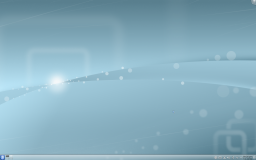 |
Надежный и гибкий диспетчер окон для рабочего стола KDE, теперь с видеоэффектами! |
Обзор возможностей
- Стабильный и надежный
- Композитный, с трёхмерными эффектами
- Простота настройки
- Улучшенная эффективность
KWin (произносится как "квин") — это диспетчер окон для рабочего стола KDE. Он даёт полный контроль над окнами, таким образом, чтобы помочь в решении ваших задач. Он отвечает за оформления окон, заголовок окна с (настраиваемыми) кнопками, такими как «закрыть», «распахнуть», «свернуть». Он также отвечает за размещение окон на рабочем столе и переключение между ними.
KWin поддерживает композитность, что означает использование трёхмерных эффектов при отрисовке окон. Это может сделать управление окнами более гладким, лёгким и более эффективным и естественным. Его аппаратные требования очень скромные, и почти каждая разумно современная система с 2002 года поддерживает его. Могут быть небольшие проблемы с некоторой аппаратурой, более подробно на эту тему можно узнать на странице KWin в TechBase.
Удобные возможности
Click with your right mouse button on a window decoration or use System Settings to access the new and easier configuration of KWin. Here you can enable effects to more efficiently manage your windows. You can for example use the Present Windows as the effect for window switching. Instead of showing you icons or very small previews of your applications, it arranges them in a grid so you can quickly choose the right one. Just use the Alt-Tab keysequence and keep the Alt key pressed. You can now use tab to switch through the windows or just activate the right one using the mouse. Hitting Alt-Tab keys quickly will show you the next window in the queue, just like it used to.
If your X server already supports compositing, switching it on is as easy as opening System Settings, opening the module, choosing and enabling the checkbox . More advanced compositing settings (such as VSync operation, Direct rendering, compositing mode) are available through the dialog. Customising the behaviour of the KWin effects means opening the tab, and choosing the plugins you want to use. Please note that only a subset of the plugins works with XRender-based compositing. For the full experience, you need to use OpenGL mode.
Employing motion physics, KWin provides your windows with a more natural feel. New desktop effects like the Cube desktop switcher and Magic Lamp minimize animation have been added. Improvements in the existing effects make window management smoother than ever. KWin has seen many performance improvements to enable these effects even on low-end hardware. Elaborate checks have been build in to ensure users with low-end hardware are not presented with an unusable setup. KWin detects the capabilities of the hardware and if needed gracefully scales its effects down. You can take control and disable these checks or change settings like the global animation speed to fine-tune your experience. When your computer is under heavy load, KWin will automatically disable the compositing temporarily to keep things running smoothly. It will notify you if it does so, and you can re-enable compositing by pressing Shift+Alt+F12. Finally, support for multiple screen handling has been improved in KWin using the new Kephal library. You can move maximized windows between Xinerama screens and the addition of external screens is handled correctly.
More information about what was introduced in KDE SC 4.2 can be found at the following link:
Tutorials
You want an application to launch in a specific size and position every time
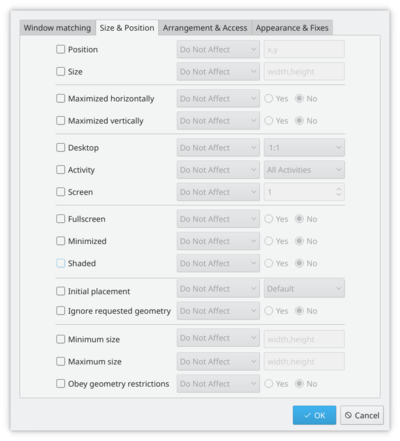
Sometimes the screen position of an application is vital to your comfort, so use the flexibility of KWin to make sure it's always where you want it.
Position the window where you want it to open, then right-click on the title-bar, choosing . This will open a settings window, with appropriate entries already made. All you need to do now is select the tab and check and . OK - you are finished!
Script the window manager from the command line
Use the WMIface utility.
Настройка расположения кнопок заголовка окна
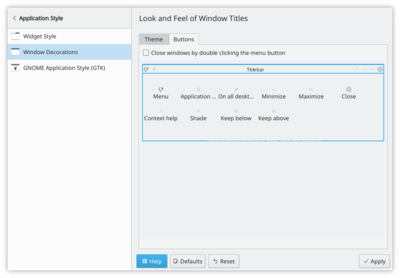
Перейдите к виду и включите переключатель «Использовать своё расположение кнопок заголовка окна». Доступные параметры могут зависеть от дистрибутива или используемой темы оформления.
Perhaps you would like more space between the button and the pair? So you will want to add a - two if you wish.
To simply move things around you work with the speciman titlebar - that is the dark blue bar with a large KDE on it. Drag icons there and you will see them move in the preview window at the bottom of the screen.
You may find that you have other icons available to you. A circle indicates that the button will set that window on all desktops. Another icon that you may find useful is Shade - a toggle between rolled up (titlebar only visible) and normal view. These icons are added by dragging from the text description window onto the speciman title bar - just position them as you want to use them.
Если вы предпочитаете классический рабочий стол в стиле KDE3

|
| Change to traditional desktop |
Щёлкните правой кнопкой на рабочем столе и выберите Настроить виджет «Рабочий стол». Измените тип с «Рабочий стол» на «Просмотр папки». Отныне рабочий стол стал просмотром папки и следующий щелчок правой кнопкой вызовет контекстное меню для просмотра папки. Установите просмотр папки на каталог, который вы хотите использовать как свой рабочий стол.
Видеодемонстрация возможностей KWin
Демонстрация возможностей KWin здесь.
Запуск приложения сразу на другом рабочем столе
Используйте команду наподобие этой:
kstart --desktop 4 kate
Работа с маленькими экранами (например нетбуки)
Сделайте оформление окна поменьше
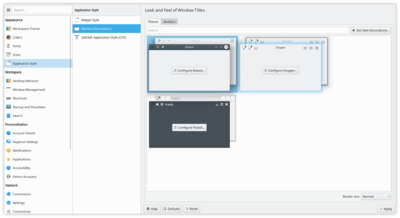
Откройте . Есть два хороших оформления:
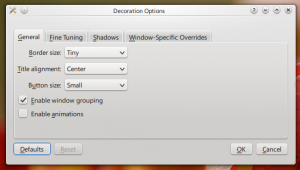
- Using the default style (Oxygen), select and set to and to
- Select the
Both routes will give you slim and functional window titles and borders.
Измените базовые шрифты
На многих нетбуках экраны очень яркие и чёткие, так что можно читать достаточно маленькие шрифты, чем можно было бы ожидать. Например для Acer Aspire One выбор размера в 8 пунктов выглядит вполне приемлемым.
Сделайте чтобы Firefox использовал шрифты меньшего размера
Experimentation with did not bring satisfactory results. Do this instead. Download and install gtk-chtheme from this website. Using that tool you can either set a specific font size, or better still, tell it to use your KDE desktop settings. This will work with Firefox as well as any gtk applications that you use.
Заголовки писем в KMail занимают слишком много места
Смотрите этот FAQ, чтобы исправить это.
Всплывающие подсказки в списке папок KMail слишком велики и скрывают имена папок
Смотрите этот FAQ, чтобы изменить их поведение.
Gallery
The Gallery holds many screenshots of past and present desktops and effects.
Troubleshoot Graphics Problems
Curing graphics problems depends on knowing the correct drivers for your graphics card. Learn more about this on the Desktop Effects Performance page.
Defining Window Rules
There is a tutorial on defining your own rules for the behaviour of specific windows on the KWin Rules pages.
